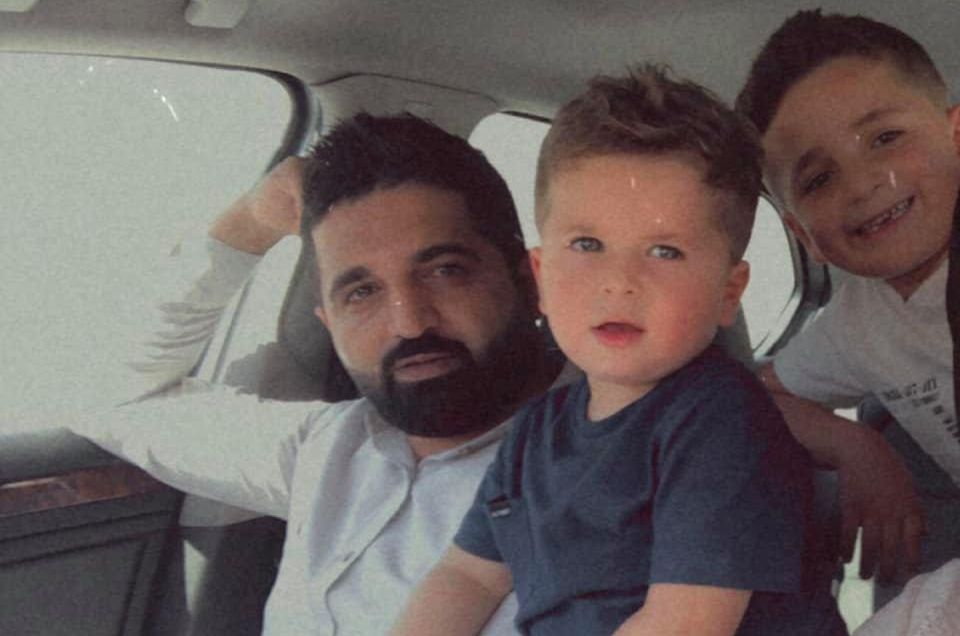‘They Were Burning Our House with Kids Inside–the Army Didn’t Let Us Through’
PALESTINE ISRAEL GAZA GENOCIDE, 13 Mar 2023
Yuval Abraham | +972 Magazine – TRANSCEND Media Service
Children trapped by settlers. A mutilated pet. Checkpoints blocking aid. A Palestinian family recounts the horrifying night of the Huwara pogrom.
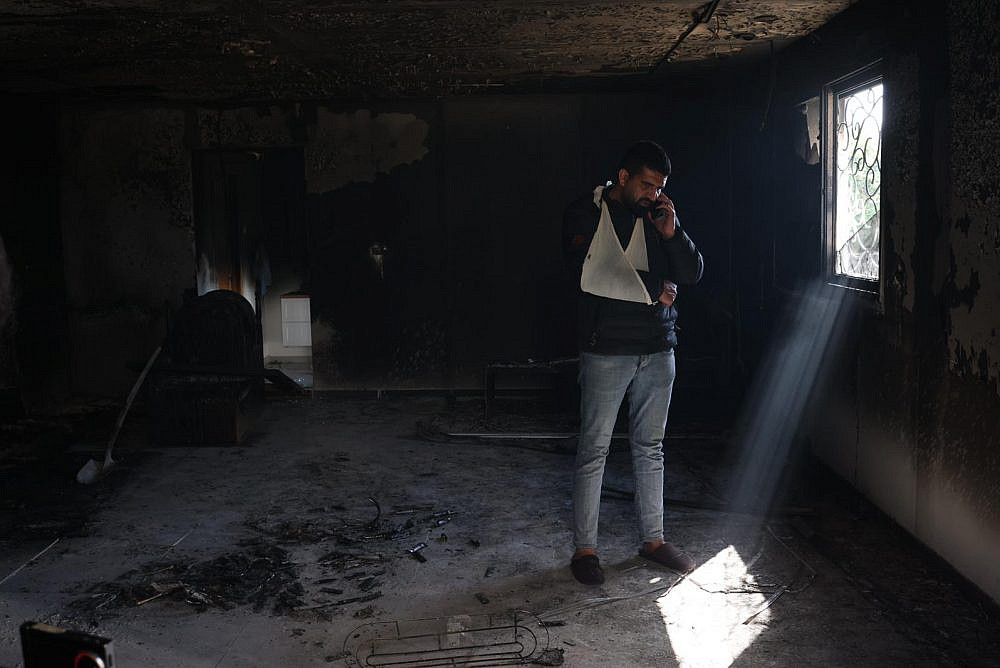
Palestinian residents of Huwara walk among their burned homes, cars, and businesses the morning after Israeli settlers rampaged through their town in the West Bank, Feb. 27, 2023. (Oren Ziv)
Content warning: The following article contains graphic depictions of violence and animal cruelty.
2 Mar 2023 – When their first son was born six years ago, Uday Dumeidi and his wife, Ahlas, decided to adopt a ginger kitten. They built a small house on a small street in the town of Huwara in the occupied West Bank, next to an olive grove. They named their boy Taym, which comes from one of the Arabic words for “love,” and their cat Bousa, which means kiss. This is how Dumeidi told me the story, shivering as he hovered above a pool of dark blood.
On the night of the Huwara settler pogrom last Sunday, someone mutilated the cat and left it in the Dumeidi family’s yard, right next to the guest room, which was burned in its entirety.
The night after the pogrom, Dumeidi and I stood quietly in front of the blackened walls and the blood that had congealed on the ground. An empty can of cat food, a sparkly pillow where the cat once slept, and shards of glass lay around the floor. Dumeidi said that he has loved animals since childhood, that he knows how to communicate with them. “They are like a mirror of my feelings,” he said.
A silence spread across the town after the violence. Few dared to leave their homes. Earlier in the day, I walked on the main road on the way toward Uday’s home; soldiers stood next to the shuttered stores, next to burned-out cars, and only Israeli vehicles were allowed into the town, whose main road serves as a central artery for settler traffic crossing the West Bank from north to south.
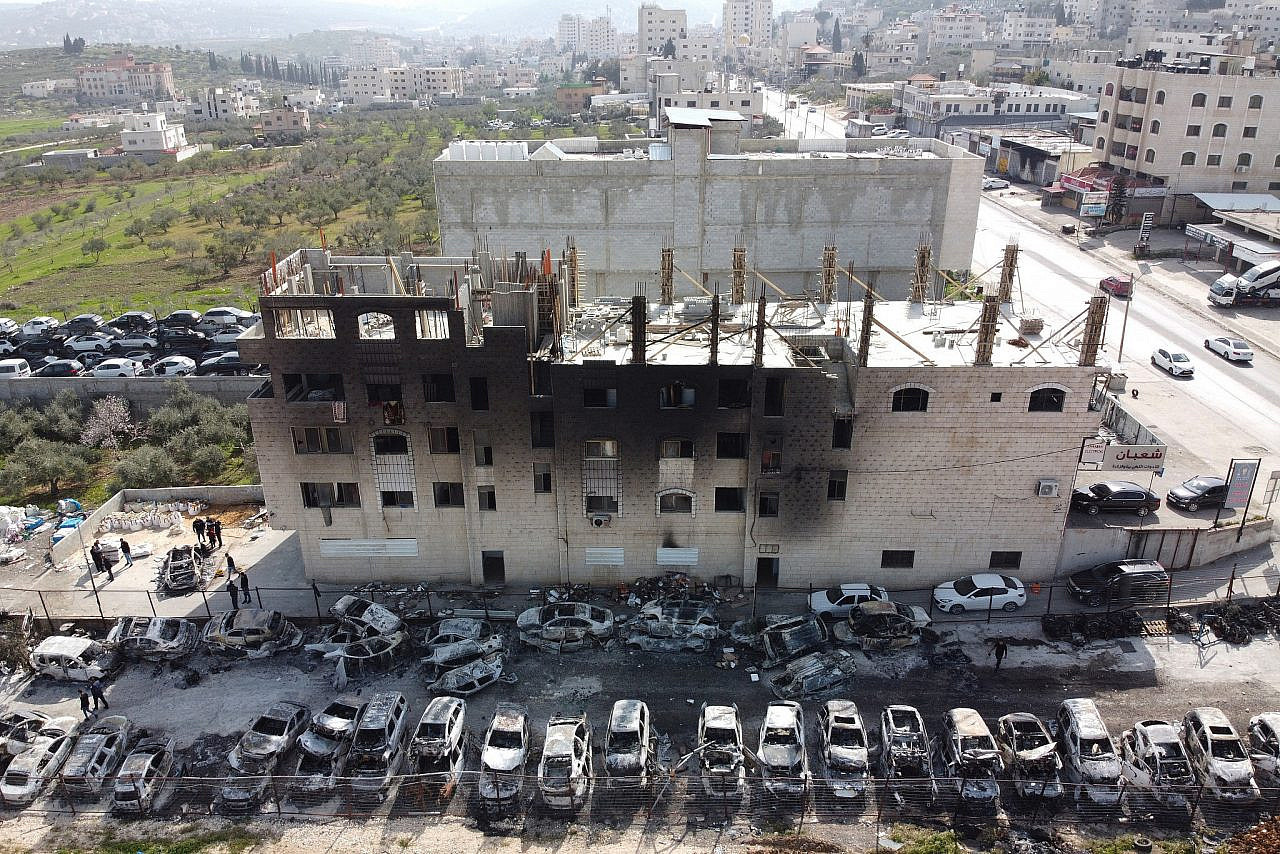
A car slowed down next to me. “What are you looking at?” I heard a voice bellow from inside. Before I could answer, two Israeli settlers jumped out of the car. Only when I said a word in Hebrew did they return to the car and drive off.
According to the Huwara town council, settlers set at least 10 homes ablaze. Israeli reports stated that 400 settlers took part in the pogrom, in revenge for the killing of Hillel and Yagel Yaniv, two brothers from the nearby settlement of Har Bracha. This is the story of one of the families who survived that pogrom.
Preparing for what comes next
It started at 6 p.m., Dumeidi said. He was at work when his wife called him. “She said [the settlers] were breaking into our house. I heard shouting in the background. My two children were screaming on the phone: ‘Dad come, Dad come.’”
Ahlas, Dumeidi’s wife, said she locked their two small sons in the bathroom. She saw the attackers from the window. She recounted the events without pausing. “There were dozens of settlers outside, they surrounded the house. At first they smashed all the windows. Then they set fire to cloth soaked in gasoline, and tried to set fire to the house through the windows. They managed to set fire to one room. The window in the bathroom is terribly small, which is why I hid the children there. They tried to enter through the door. At that moment, I don’t know what happened, I just froze. I couldn’t move anymore.” At some point during the attack, the settlers also tried to set fire to the gas tank in the yard, hoping it would explode. Luckily, it did not.
Ahlas left Huwara on Monday morning and returned to her parents’ home in the city of Salfit. She took her two children, Taym and four-year-old Jood, with her, after they received medical treatment for smoke inhalation the night before. Since then, they have been struggling to sleep.
Several families in Huwara said that they temporarily moved their children to a safer location, mostly to relatives living in larger cities such as Nablus and Salfit. Huwara is a small town located in “Area B” of the West Bank, which, under the Oslo Accords, means the Palestinian police have no security authority and are not allowed to act without coordination with the Israeli army. Israeli soldiers, then, are the ones who are supposed to protect the Palestinians in these areas. There have been enough incidents to show that, in practice, the soldiers provide cover for settler attacks. Palestinians are thus forced to fend for themselves.
I met Dumeidi as he was sitting at home alone, among the broken glass. Some relatives later came to be with him, to help protect themselves in case they were attacked again.
That night, Ahlas called him several times from Salfit, concerned for his wellbeing. Each time, Dumeidi apologized to me, looked away, and spoke softly into the phone. He told her that he was calm for now. That they are prepared for whatever happens next. He asked her if she had eaten, then wondered about what she had eaten, and his eyes suddenly welled up with tears.
‘You are completely alone’
On the night of the pogrom, it took Dumeidi an hour to reach his home because of the army checkpoints. “I was standing on the main road close to my house, at the height of the attack, but soldiers wouldn’t let me pass,” he recounted. “I went crazy. I only know a little Hebrew. My father was with me, and he shouted to them in Hebrew: ‘They are burning our house, there are small children and women inside!’ But they did not let us pass.”
Dumeidi described how he took out his phone to show the soldiers a photo of Jood, which he uses as a screensaver. “But they did not have time to look at it because my wife called. I put her on speakerphone so they could hear. All you could hear were screams. I remember hearing someone [one of the settlers] yelling in Hebrew: ‘Open up, you slut.’ That’s when one of the soldiers let me through.”
Several other witnesses who were wounded during the pogrom told similar stories. Immediately after the attack, the army imposed a curfew on Huwara. Traffic to and within the town was closed off by checkpoints. At around 6 p.m., hundreds of settlers breezed through the barriers. For at least an hour, the attackers set fire to homes inside the village, while soldiers stood on the outskirts of the village, physically preventing local residents from entering.
Dumeidi ran to his home. The air was red from the fires, he said. The attackers had divided themselves into groups, according to residents, and conducted themselves in a relatively organized manner. Around Dumeidi’s home were 30 people, a small number of them masked. Some were holding stones, Molotov cocktails, and metal rods. Others were armed with weapons. They tried to set the house on fire. He approached them from behind.
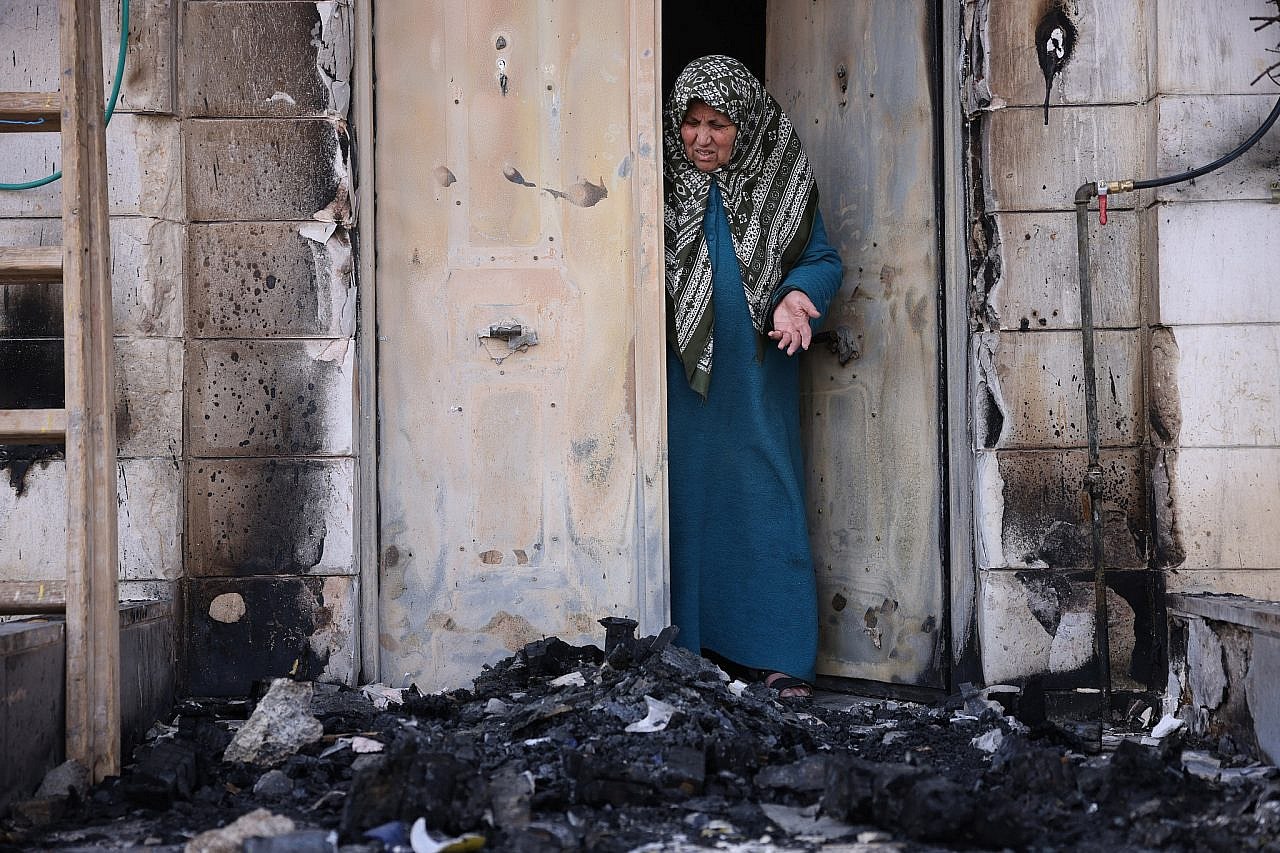
“I thought to myself: how can I get into the house like this? So I tried to pretend I was one of them. I took stones in my hands, put a hood on my head, and stood alongside them. It worked. I shouted to my wife from the window: ‘I’m here, I’m here.’ Then they realized who I was, that I was the owner of the house. They began throwing stones at me.” Dumeidi’s back still bears the marks from the stones. When I met him, he was also limping from the beatings he took.
As Dumeidi approached his home, he saw his mother lying unconscious next to the front door of the adjacent home, where she lives with his grandmother. He immediately crossed the yard to the next house, only to find his grandmother in the living room.
“She is 87 years old and suffers from a neurological disease,” he said. “She was on the floor in the living room, shaking, and something was coming out of her mouth, like foam. Her eyes were open but the pupils were not visible. She did not speak. I don’t know how to describe how I felt. Where should we go [to help] my mother, my grandmother, the children? As I’m tending to my mother, I see the settlers breaking everything from the outside. You are completely alone, and you have to protect yourself.”
A familiar dynamic
Two Palestinian eyewitnesses said that throughout this time, several Israeli soldiers were standing next to the settlers. “They just looked on,” Dumeidi concurred.
At a certain point, when more relatives and neighbors arrived at the house, the Palestinians began throwing stones, cups, and other kitchen utensils at the settlers. Soldiers then began to push back the settlers while firing tear gas at the Palestinians, before one of the soldiers opened fire on the residents. According to witnesses and the local clinic in Huwara, four Palestinians were wounded by gunfire while defending their family home; three were shot in the leg, the other was hit in the arm.
This is a familiar dynamic that repeats itself in similar attacks throughout the West Bank. A group of Israeli settlers invades a village, and when local residents throw stones at them, soldiers shoot at the Palestinians in order to protect the attacking Israelis. Thus, the attack is actually prolonged — and sometimes turns fatal.
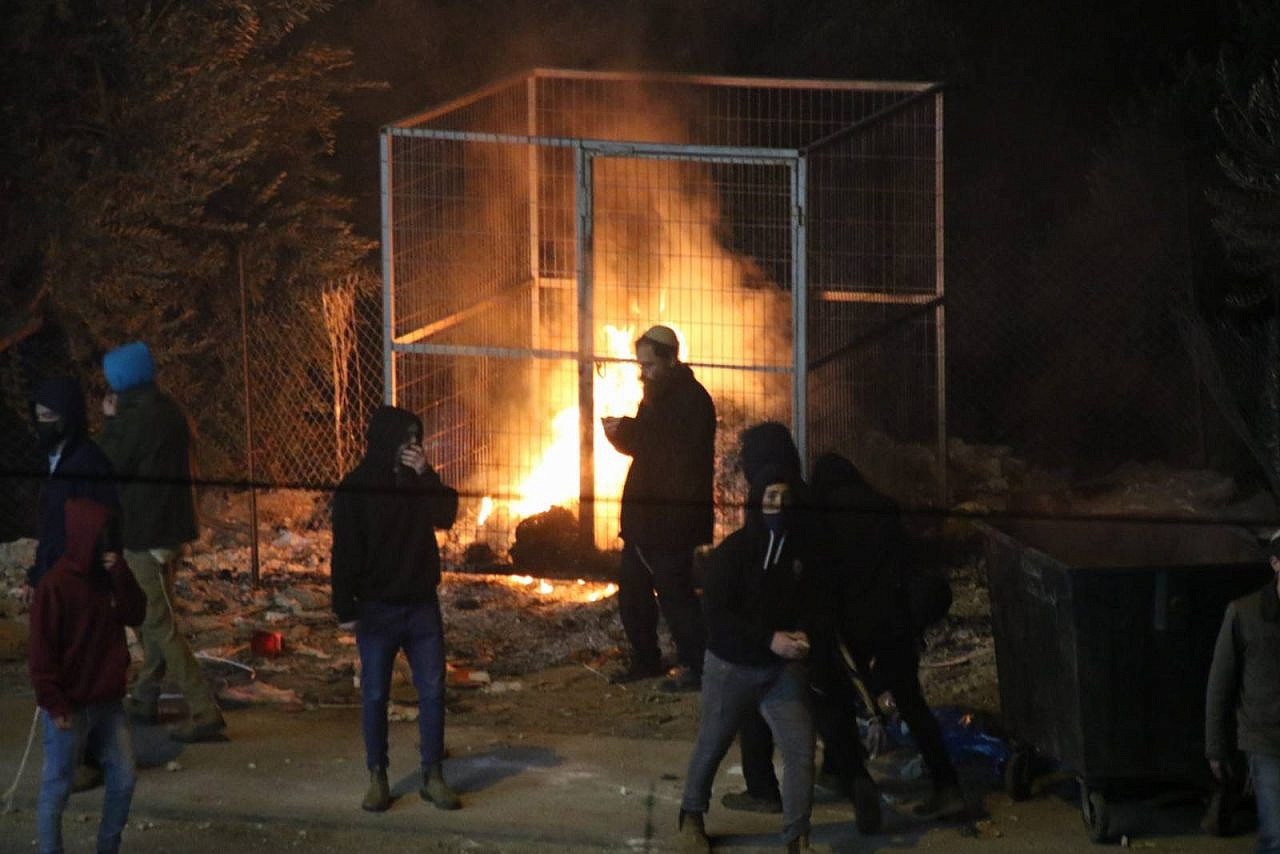
Since 2021, army fire has killed at least four Palestinians in villages in the northern West Bank during documented attacks by masked settlers: Muhammad Hassan, 21, in Qusra; Nidal Safdi, 25, in Urif; Hussam Asaira, 18, from Asira al-Qabilyia; and Oud Harev, 27 years old, in Ashaka. It would not be surprising if Sameh Aqtesh, who was killed during Sunday’s violence in Huwara, died under similar circumstances, although the exact details of his death have not yet fully come to light.
The neighbors who came to Dumeidi’s aid eventually managed to drive the attackers away. The settlers burned one room and stole watches, a television, and a laptop. “They took everything out from the inside, and the last one who came out burned the room,” Dumeidi said. When the family came outside, they found their cat, Bousa, mutilated.
‘Isn’t it a shame to die like this?’
Late at night, as I headed to my car to make the journey back to Jerusalem, I heard whistling from one of the rooftops. A group of 10 Palestinian men stood above me on top of a home whose windows had all been smashed, and motioned for me to be careful. They told me to walk slowly in their direction, because they saw from the roof that settlers had just entered the village again. Someone came down, opened a locked gate, and took me upstairs. They suggested that I wait with them until the storm passed, and told me to hope that they wouldn’t burn my car, which was parked on the main road.
On the roof, I saw two buckets full of stones and a few slingshots. The group explained that during the pogrom, no one was able to arrive to protect their homes in time, which is why the settlers were able to do so much damage. Around 15 relatives and neighbors had traveled for an hour on winding roads from Nablus to circumvent the army checkpoints and reach Huwara. It is important to be here together, as a family, should anything happen, they said.
It was dark. Someone offered me a coat. The roofs around us were also full of families, looking on. Waiting. Below, on the quiet main street, white lights shone. Above was a tall mountain, a round silhouette, and at its peak a thin strip of light. These are the houses of the settlement of Yitzhar. A phone suddenly flashed. Someone got a message. “There was an attack in Jericho, there are casualties.” Someone else asked me if it was true that there were demonstrations in Israel against the pogrom.
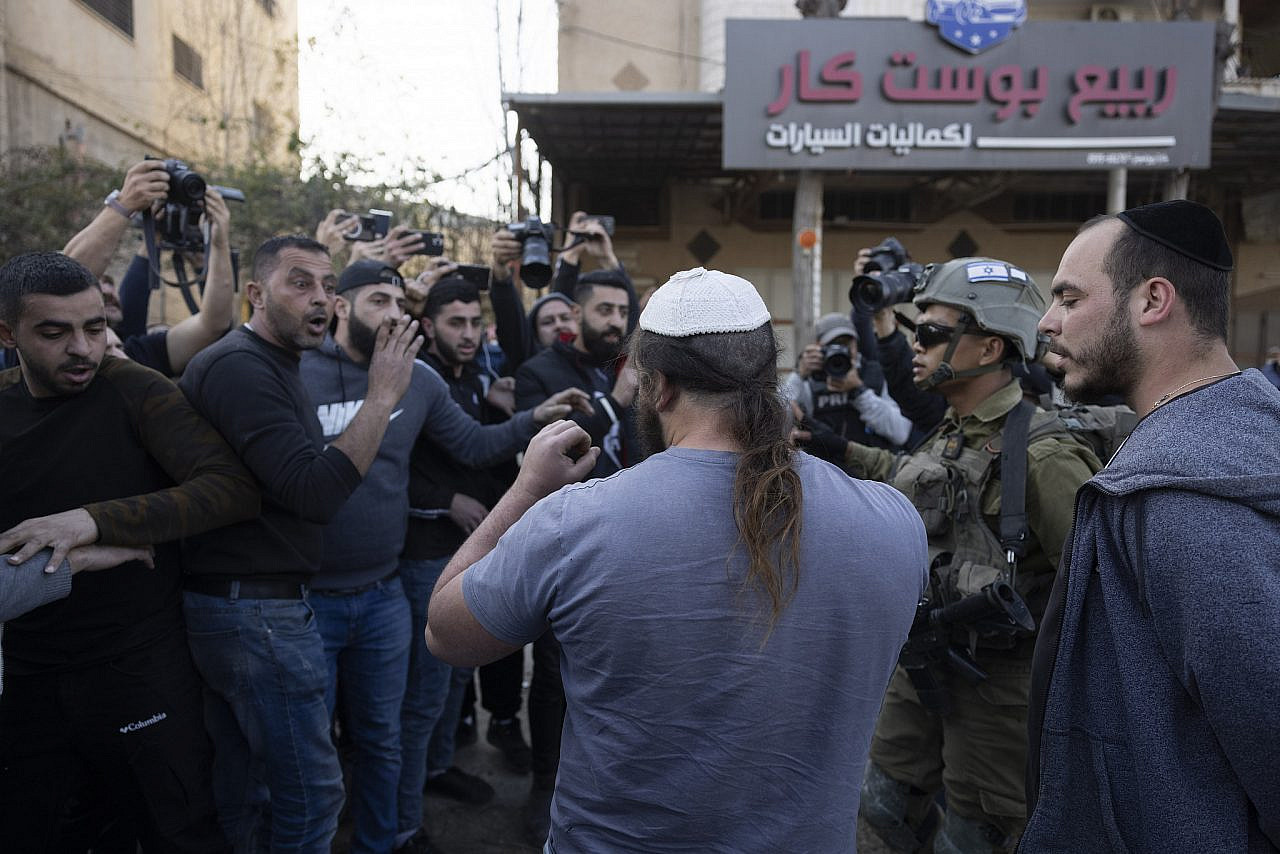
When he heard that I am Jewish, the eldest man in the group held out his hand and said in fluent Hebrew: “What is all this good for? All these people who die, on our side and your side. Isn’t it a shame to die like this, for land? Our destiny is to live here together.” He said that he had worked all of his life in Israel, participated in dialogue groups, and that real peace is needed, with equality and respect for his people, who live “as second-class subjects of the army, with green IDs.”
A young man next to him grinned. Then he said to me in Arabic: “Look, look,” as he picked up a stone, placed it in the slingshot, and released it. The stone smashed against the walls of the roof. He offered me a cigarette. I tried to break the ice, saying that it looks like there may be a war soon. “I wish,” he responded casually.
It turned out that we are both exactly the same age. But he has never left the West Bank. He has never seen the sea nor visited Jerusalem. His father was imprisoned during the Second Intifada, and since then the entire family has been on the Shin Bet’s blacklist, meaning they cannot receive permits, and soldiers stop them from time to time at checkpoints. He knew almost no Hebrew. Like all the young men who were waiting there, alert on the roof, he is part of a generation born into Israel’s permit regime and under the shadow of the separation wall.
We spoke for an hour about violence. He said it had increased since the election of the new government, but it had always been there. He talked about the frustration with the Palestinian Authority, which “does everything Israel says” and only maintains the occupation, and how he hopes that something will change already — even if it’s a war — as long as there is change. He told me about a friend of his who was shot by soldiers for throwing stones, and how since then he has been in a rage that he cannot let go.
Below us, a group of settlers carrying Israeli flags tried entering Huwara again. Soldiers blocked them this time. On this roof, at least, the night passed quietly.
_________________________________________________
Yuval Abraham is a journalist and activist based in Jerusalem.
A version of this article was first published on Local Call in Hebrew. Read it here.
Tags: BDS Boycott Divestment Sanctions, Colonialism, Cultural violence, Direct violence, Ecocide, Gaza, Genocide, Israeli Apartheid, Israeli Army, Israeli occupation, Middle East, Nakba, Palestine, Palestine/Israel, Sociocide, State Terrorism, Structural violence, Violent conflict, West Bank, Zionism
Join the BDS-BOYCOTT, DIVESTMENT, SANCTIONS campaign to protest the Israeli barbaric siege of Gaza, illegal occupation of the Palestine nation’s territory, the apartheid wall, its inhuman and degrading treatment of the Palestinian people, and the more than 7,000 Palestinian men, women, elderly and children arbitrarily locked up in Israeli prisons.
DON’T BUY PRODUCTS WHOSE BARCODE STARTS WITH 729, which indicates that it is produced in Israel. DO YOUR PART! MAKE A DIFFERENCE!
7 2 9: BOYCOTT FOR JUSTICE!
DISCLAIMER: The statements, views and opinions expressed in pieces republished here are solely those of the authors and do not necessarily represent those of TMS. In accordance with title 17 U.S.C. section 107, this material is distributed without profit to those who have expressed a prior interest in receiving the included information for research and educational purposes. TMS has no affiliation whatsoever with the originator of this article nor is TMS endorsed or sponsored by the originator. “GO TO ORIGINAL” links are provided as a convenience to our readers and allow for verification of authenticity. However, as originating pages are often updated by their originating host sites, the versions posted may not match the versions our readers view when clicking the “GO TO ORIGINAL” links. This site contains copyrighted material the use of which has not always been specifically authorized by the copyright owner. We are making such material available in our efforts to advance understanding of environmental, political, human rights, economic, democracy, scientific, and social justice issues, etc. We believe this constitutes a ‘fair use’ of any such copyrighted material as provided for in section 107 of the US Copyright Law. In accordance with Title 17 U.S.C. Section 107, the material on this site is distributed without profit to those who have expressed a prior interest in receiving the included information for research and educational purposes. For more information go to: http://www.law.cornell.edu/uscode/17/107.shtml. If you wish to use copyrighted material from this site for purposes of your own that go beyond ‘fair use’, you must obtain permission from the copyright owner.
Read more
Click here to go to the current weekly digest or pick another article:
PALESTINE ISRAEL GAZA GENOCIDE:
